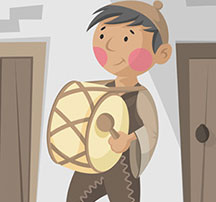One of the main charming symbols of the Holy Month of Ramadan in Syria is represented by the Mosaharati, a man who roams streets and alleys, especially in Old Damascus to awaken people for having a meal before the start of their fasting day.
Historically speaking, the Mosaharati is one of the oldest, most deep-rooted traditions found in Ramadan. The vocation first appeared during the Abbasid era. In the Fatimid era, the ruler issued a decree asking people to sleep early during Ramadan, while some soldiers were appointed to knock on people’s doors and waking them to have their Sohor meal. Since then, the mosaher has been a basic characteristic of Ramadan in all Arab countries. Despite the decline of this tradition, especially in modern cities, the mosaher is still one of the many charms of the holy month of Ramadan and has become a constituent of its folklore to which people feel nostalgia just like other charms of Ramadan which started to be obsolete.
In the past, the Mosaherati used to go to a high place, beat his drum and cry calling on people to wake up. But as the city was expanded and enlarged, every neighbourhood started to have its own Mosaharati. As he reaches each house, he stands in front of it and calls its residents by their name names. The Mosaharati is greatly respected in his neighbourhood. He is considered to be a wise man capable of memorizing all the names of the quarter.
The people of the neighbourhood used to give the Mosaharati some food in the past, but nowadays he is given some money by the end of the holy month.
The Mosaherati usually should have a beautiful and thrilling voice to chant some songs that help in making people wake up. He sings rhyming tales to wake people. Among the most famous chants is “Awake, oh faster and praise God Almighty. Welcome Ramadan, month of amnesty.”
K.Q.

